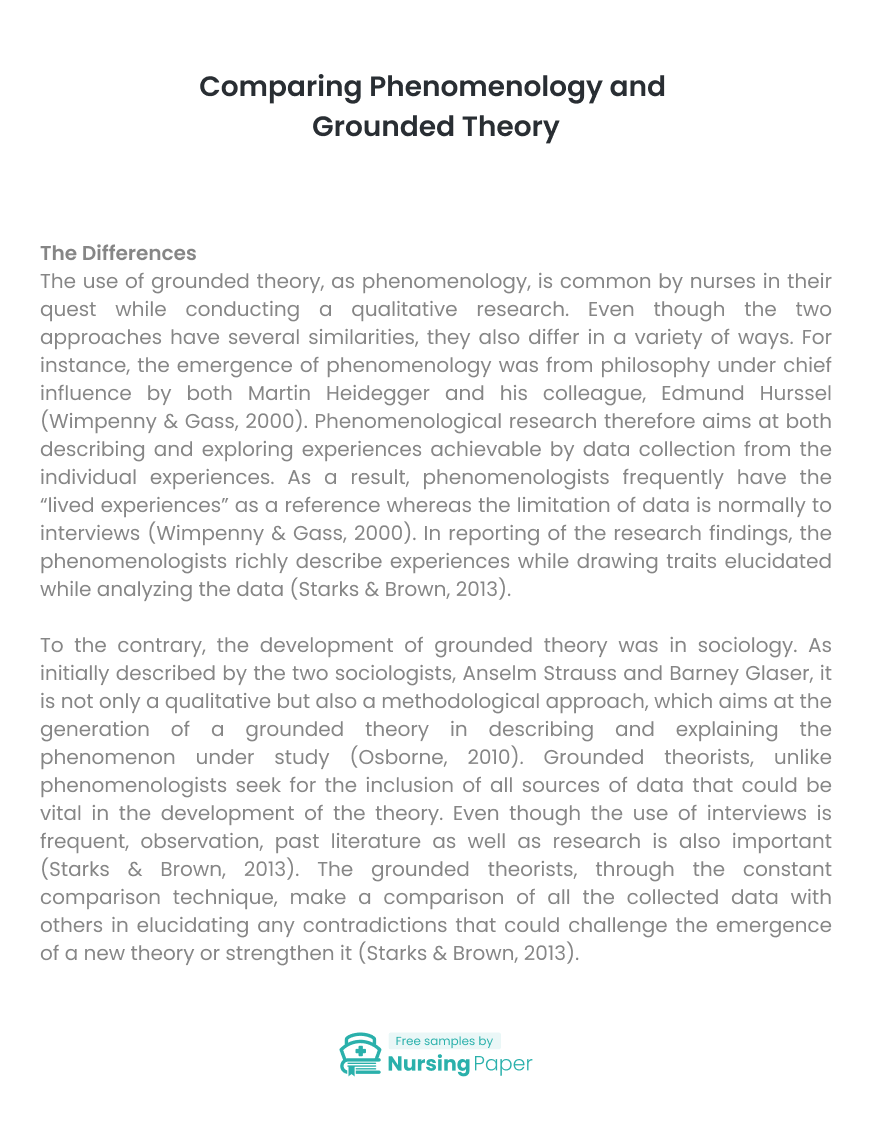
Comparing Phenomenology and Grounded Theory
The Differences
The use of grounded theory, as phenomenology, is common by nurses in their quest while conducting a qualitative research. Even though the two approaches have several similarities, they also differ in a variety of ways. For instance, the emergence of phenomenology was from philosophy under chief influence by both Martin Heidegger and his colleague, Edmund Hurssel (Wimpenny & Gass, 2000). Phenomenological research therefore aims at both describing and exploring experiences achievable by data collection from the individual experiences. As a result, phenomenologists frequently have the “lived experiences” as a reference whereas the limitation of data is normally to interviews (Wimpenny & Gass, 2000). In reporting of the research findings, the phenomenologists richly describe experiences while drawing traits elucidated while analyzing the data (Starks & Brown, 2013).
To the contrary, the development of grounded theory was in sociology. As initially described by the two sociologists, Anselm Strauss and Barney Glaser, it is not only a qualitative but also a methodological approach, which aims at the generation of a grounded theory in describing and explaining the phenomenon under study (Osborne, 2010). Grounded theorists, unlike phenomenologists seek for the inclusion of all sources of data that could be vital in the development of the theory. Even though the use of interviews is frequent, observation, past literature as well as research is also important (Starks & Brown, 2013). The grounded theorists, through the constant comparison technique, make a comparison of all the collected data with others in elucidating any contradictions that could challenge the emergence of a new theory or strengthen it (Starks & Brown, 2013).


The Similarities
Even though the two approaches of qualitative data analysis differ widely, they have several similarities. For instance, both grounded theory and phenomenology normally assume the approach of an interpretivist where the researcher is involved in exploration of real-life situations (Wimpenny & Gass, 2000). Therefore, the two both require the researcher to interact with the individuals or situations under examination at a high degree, normally as interviews or observations. Phenomenologists, like grounded theorists also seek the collection as well as the analysis of data from the perspectives of the participants, trying as much as possible to prevent infiltration of preconceived ideas into their findings (Starks & Brown, 2013). Therefore, the analysis normally involves the participants as a way of increasing the findings’ trustworthiness.
1. Osborne, J. W. (2010). Some similarities and differences among phenomenological and other methods of psychological qualitative research. Canadian Psychology , 35(2), 167.
2. Starks, H., & Brown, T.S. (2013). Choose your method: A comparison of phenomenology, discourse analysis, and grounded theory. Qualitative health research, 17 (10), 1372-1380.theory: is there a difference?. Journal of advanced nursing, 31 (6), 1485-1492.
3. Wimpenny, P., & Gass, J. (2000). Interviewing in phenomenology and grounded. Journal of Advanced Nursing, 31(6):1485-92.



The download will start shortly.

The download will start shortly.
 Subject:
Nursing
Subject:
Nursing  Number of pages: 17
Number of pages: 17  Subject:
Nursing
Subject:
Nursing  Number of pages: 4
Number of pages: 4  Subject:
Nursing
Subject:
Nursing  Number of pages: 2
Number of pages: 2  Subject:
Health and Social Care
Subject:
Health and Social Care  Number of pages: 2
Number of pages: 2  Subject:
Nursing
Subject:
Nursing  Number of pages: 3
Number of pages: 3  Subject:
Medicine
Subject:
Medicine  Number of pages: 4
Number of pages: 4  Subject:
Health and Social Care
Subject:
Health and Social Care  Number of pages: 5
Number of pages: 5  Subject:
Health and Social Care
Subject:
Health and Social Care  Number of pages: 2
Number of pages: 2  Subject:
Health and Social Care
Subject:
Health and Social Care  Number of pages: 5
Number of pages: 5  Subject:
Health and Social Care
Subject:
Health and Social Care  Number of pages: 2
Number of pages: 2  Subject:
Health and Social Care
Subject:
Health and Social Care  Number of pages: 6
Number of pages: 6  Subject:
Health and Social Care
Subject:
Health and Social Care  Number of pages: 3
Number of pages: 3  Subject:
Nursing
Subject:
Nursing  Number of pages: 6
Number of pages: 6  Subject:
Medicine
Subject:
Medicine  Number of pages: 2
Number of pages: 2  Subject:
Nursing
Subject:
Nursing  Number of pages: 16
Number of pages: 16 
